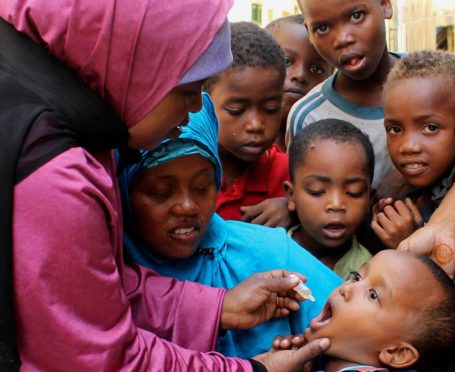
As the coronavirus pandemic continues, there is some good news as Africa prepares to eradicate one of the world’s most devastating diseases.
And a Scots civil servant has emerged as the unlikely hero in the battle to wipe out polio.
A vaccine was developed in 1955 after a series of outbreaks that killed up to 30% of adult sufferers and left many others, including children, disabled. But John Primrose has played a key role in stamping out the highly-contagious disease in Nigeria, meaning Africa is on the brink of being declared polio-free.
There have been no cases in the country for three and a half years, whereas in 2012 Nigeria had half of all polio infections in the world.
An announcement – due next month – about Africa being polio-free will leave only Pakistan and Afghanistan with cases. Mr Primrose, who served as deputy head of country for the Department for International Development in Nigeria before starting a new Foreign Office role in March, said: “For Africa to be on the brink of being declared wild poliovirus free is momentous. Nigeria is the final piece of the jigsaw. It’s now been over three and a half years since there was a wild poliovirus case detected in the country.
“If the final push to eradicate polio in Nigeria and Africa is confirmed as successful, we’ll only have Pakistan and Afghanistan to go.”
Coronavirus has been dominating global headlines in 2020 but for years polio was one of the most feared infectious diseases. It is incurable and, while some sufferers developed only mild symptoms, it had a frightening death rate and some sufferers had to be treated in primitive iron lung devices.
Europe was declared polio-free in 2002 and now an immunisation programme in Africa has been declared a success.
Prime Minister Boris Johnson last month hosted a virtual Global Vaccine Summit, where world leaders pledged $8.8 billion for Gavi, the Vaccine Alliance, to carry out its vital immunisation work. Meanwhile, the UK Government committed to contribute £1.65bn over the next five years to immunise 300 million children in poorer countries against illnesses such as polio, diphtheria and measles.
A £400 million UK aid package had already been announced in November 2019 to support the Global Polio Eradication Initiative (GPEI) in November 2019 for 2020-23.
Mr Primrose, 39, from Glasgow, who lives in Nigeria with wife Alison and children Taya, nine, and six-year-old Thomas, has also worked with the Bill and Melinda Gates Foundation to overcome the problems of delivering vaccinations in rural areas. Covid-19 and the Boko Haram conflict in Nigeria have added to the challenge.
He added: “Obviously, the world’s focus just now is on containing coronavirus, but the threat from other deadly diseases such as polio, measles and typhoid has not just disappeared, which is why the pledges made to Gavi at the Global Vaccine Summit are so very welcome.
“By immunising against vaccine-preventable diseases like polio, we can ease the strain on fragile health systems to help poorer countries better deal with the Covid-19 pandemic.
“The coronavirus lockdown restrictions, added to continued violence, have complicated our ability to wipe out the threat of this killer disease. However, we are working with the Nigerian authorities to keep frontline workers safe, improve vaccine delivery in the time of Covid-19, and ensure continued coverage.
“We are playing a key role in making the world polio-free. The UK Government’s Gavi pledge alone will help immunise up to 75 million children in the world’s poorest countries.”
He added: “Nigeria is a challenging place to deliver health care, especially in the north-east where over 4.5 million people have been displaced by terrorist groups like Boko Haram. Nigeria has the world’s second-highest maternal mortality, second-highest mortality, and the highest number of malaria cases in the world, so there is still much work to do.”

Enjoy the convenience of having The Sunday Post delivered as a digital ePaper straight to your smartphone, tablet or computer.
Subscribe for only £5.49 a month and enjoy all the benefits of the printed paper as a digital replica.
Subscribe